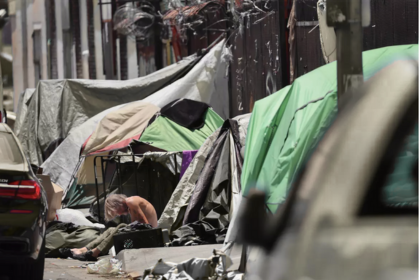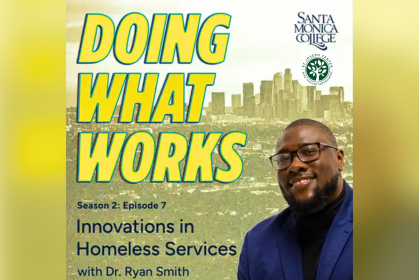SJC in the NEWS
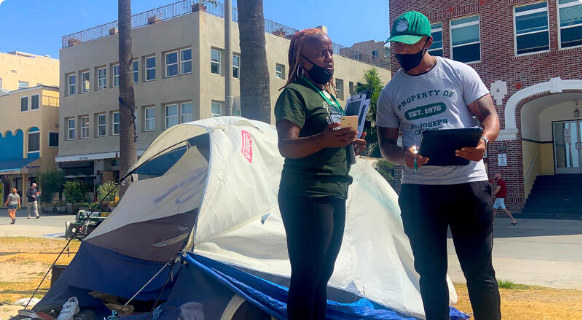
Report: L.A. homelessness program found housing for nearly all clients
November 20, 2023
Los Angeles, CA
USC Price’s Homelessness Policy Research Institute examined the encampment outreach effort in Venice Beach.
A recent homelessness outreach effort in Los Angeles moved 93% of its clients into permanent housing — far above the normal rate than standard outreach programs. That’s according to a new report from the USC Price School of Public Policy’s Homelessness Policy Research Institute.
https://today.usc.edu/report-l-a-homelessness-program-found-housing-for-nearly-all-clients/
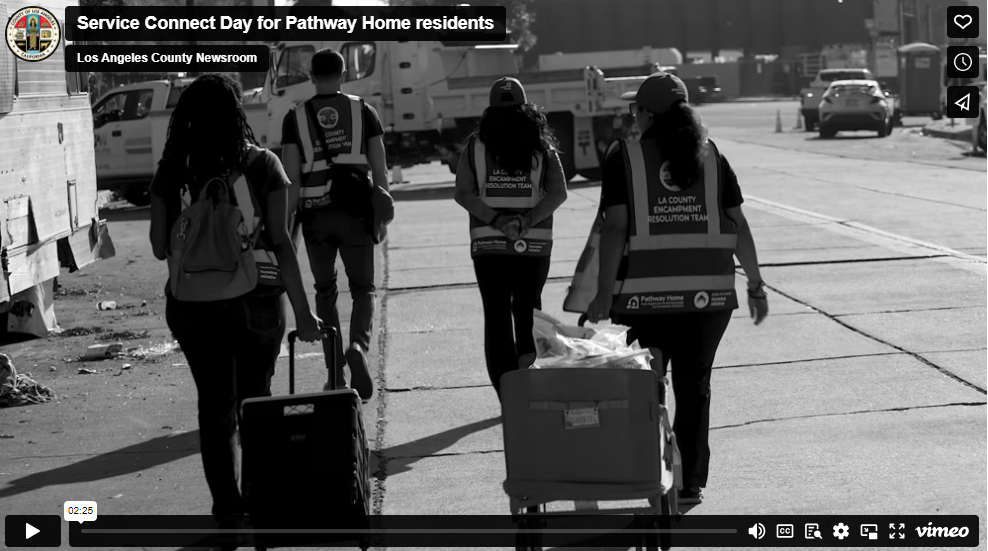
St. Joseph Center Addresses RV Encampments with LA County's Pathway Home Program
October 17, 2023
Los Angeles, CA
Los Angeles County hosted its second Pathway Home Service Connect Day for residents who moved from their recreational vehicle (RV) encampments in unincorporated East Gardena bordering West Rancho Dominguez. St. Joseph Center joined forces with the County to connect restorative services to families and individuals living in broken-down RVs. The testimonials from participants in the video are a demonstration of how this compassionate collaboration helps struggling Angelenos experiencing homelessness stabilize their living situation and secure safe, affordable housing.
Video credit: County of Los Angeles
Ready Full Story: https://homeless.lacounty.gov/news/more-pathway-home-participants-connect-with-county-services/
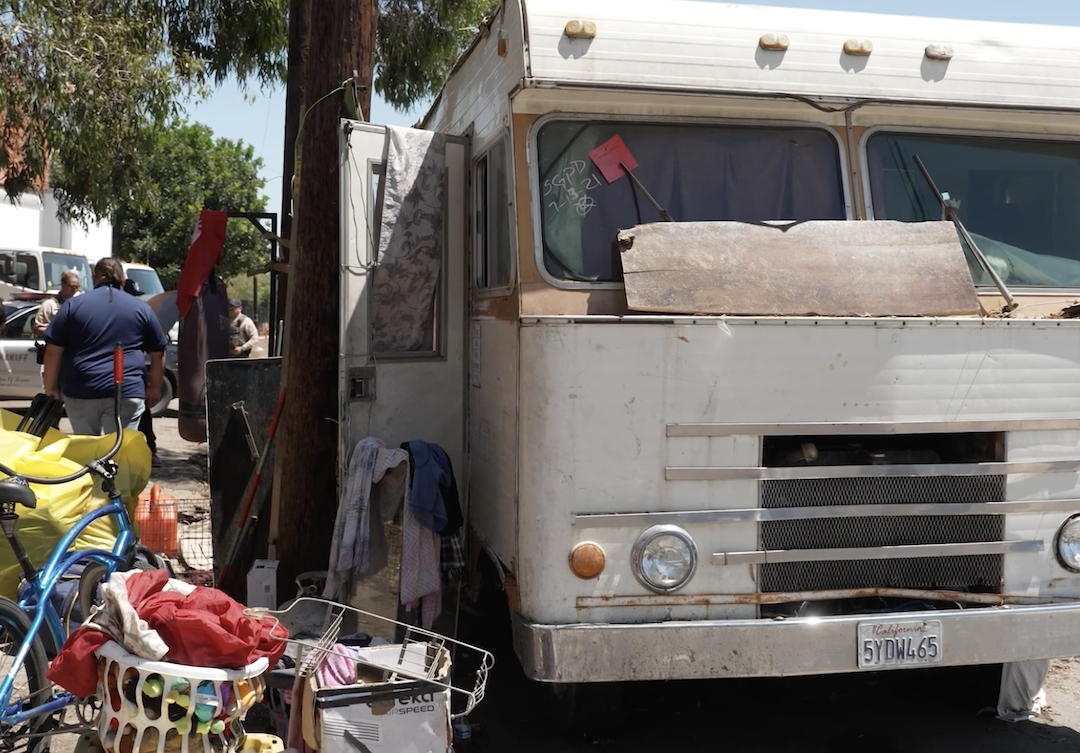
Los Angeles County Successfully Launches Pathway Home for RV Encampments
09/06/2023
Los Angeles, CA
58 people housed and 30 RVs taken off the streets in East Gardena
St. Joseph Center’s Vehicular Homeless Outreach Program (VHOP) was proud to join LA County’s new Pathway Home initiative to resolve encampments, including recreational vehicles (RVs). 58 people were placed into interim housing where they will receive all the necessary support to become permanently housed – including families with children – 30 dilapidated and unsafe RVs were removed on the streets of unincorporated East Gardena bordering West Rancho Dominguez.
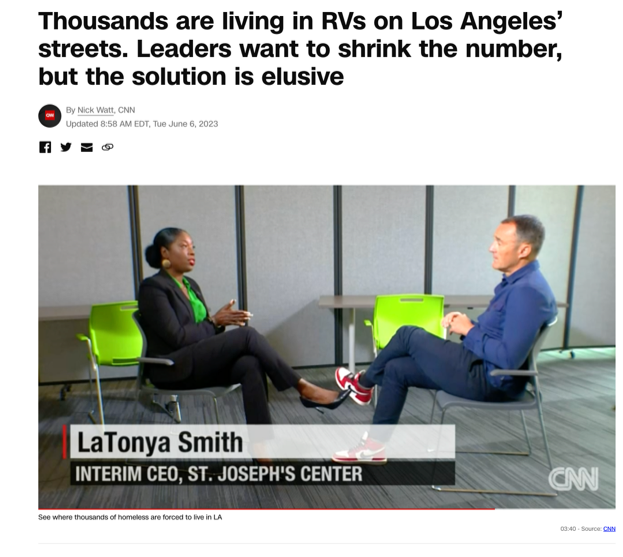
Thousands are living in RVs on Los Angeles’ streets. Leaders want to shrink the number, but the solution is elusive | CNN
06/06/2023
Los Angeles, CA
Early one recent Friday morning, sanitation workers, homeless-outreach workers and LAPD officers arrived on a little street in the west of Los Angeles. Jasmine Avenue is lined with low-rise apartment blocks, an imposing Catholic Church, a school and a handful of dilapidated recreational vehicles.
St. Joseph Center's 46th Anniversary Gala
7pm June 3rd 2023
City Market Social House 1145 San Pedro St. Los Angeles, CA 90015
The 5th Dimension will perform at St. Joseph Center’s 46th Anniversary Gala fundraiser in Downtown LA on June 3rd. Expience the power of community at this amazing event, which will also honor Denise Hart and Dan Schwala.
Great food, drinks, special entertainment by Grammy-award-winning all-female Mariachi Divas de Cindy Shea and more!
Your ticket purchase supports St. Joseph Center services: Housing, Mental Health, Outreach/Food Assistance, and Job Training.
Can’t attend? >> Please donate here
The 5th Dimension will perform at St. Joseph Center’s 46th Anniversary Gala fundraiser in Downtown LA on June 3rd. Expience the power of community at this amazing event, which will also honor Denise Hart and Dan Schwala.
Great food, drinks, special entertainment by Grammy-award-winning all-female Mariachi Divas de Cindy Shea and more!
Your ticket purchase supports St. Joseph Center services: Housing, Mental Health, Outreach/Food Assistance, and Job Training.
Can’t attend? >> Please donate here
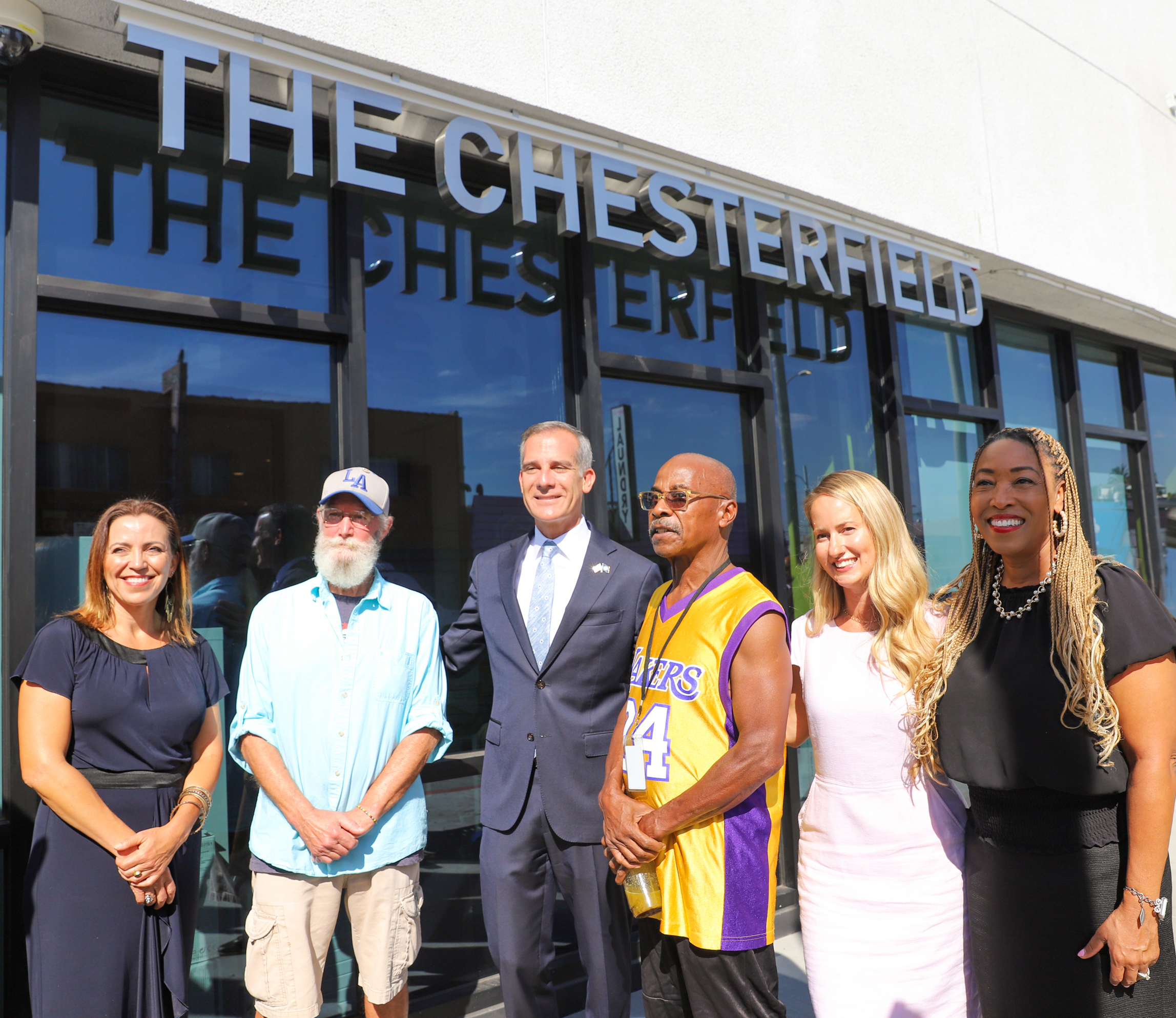
The Chesterfield Grand Opening: New Affordable Community Houses Formerly Homeless Seniors in LA
9/27/2022
Los Angeles, CA
On September 27th, Mayor Eric Garcetti announced the grand opening of The Chesterfield apartments. Located at 4723 South Normandie Avenue, these feature “42 new permanent supportive housing units that will be a sanctuary for formerly homeless seniors.”
Photo credit: Carolina Ferreira
On September 27th, Mayor Eric Garcetti announced the grand opening of The Chesterfield apartments. Located at 4723 South Normandie Avenue, these feature “42 new permanent supportive housing units that will be a sanctuary for formerly homeless seniors.”
St. Joseph Center partnered with The Chesterfield’s owner/operator Wakeland Housing and Development Corporation, to provide supportive services to help our senior residents become stable and thrive.
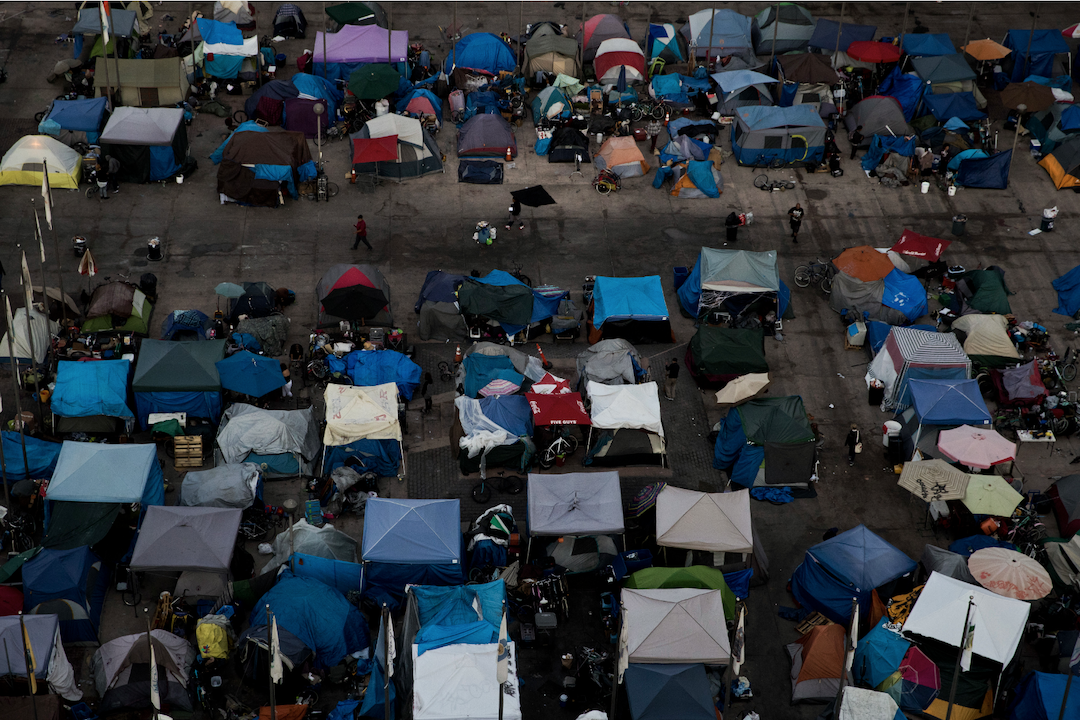
There’s a Right Way and a Wrong Way to Address Encampments
August 1, 2022
Los Angeles, CA
St. Joseph Center's 45th Anniversary Gala at Petersen Automotive Museum
6/28/2022
Los Angeles, CA
Jimmy Kimmel and wife Molly McNearney celebrated St. Joseph Center’s 45th anniversary gala with Dr. Va Lecia Adams Kellum, President and CEO of St. Joseph Center, at the Petersen Automotive Museum on June 4, 2022 in Los Angeles, California.
Anniversary Celebration
Jimmy Kimmel and wife Molly McNearney celebrated St. Joseph Center’s 45th anniversary gala with Dr. Va Lecia Adams Kellum, President and CEO of St. Joseph Center, at the Petersen Automotive Museum on June 4, 2022 in Los Angeles, California.
Credit: Jevone Moore/ US Weekly / St. Joseph Center
InTouch
Hot Pics: What Your Favorite Stars Are Up to This Month
Life&Style
Hot Pics: What Your Favorite Celebrities Are Doing This Month
Young, Bold & Regal
We are here at the @stjosephctr 45th Anniversary Gala with our @YOUNGBOLDANDREGAL
We loved speaking with the @thetemptations at the St. Joseph’s Center 45th Anniversary Gala.
@JIMMYKIMMEL and his wife at the @stjosephctr 45th anniversary #Gala!
Jimmy Kimmel Mayor Eric Garcetti at St. Joseph Center 45th Anniversary Gala
Jimmy Kimmel At Saint Joseph’s Center 45th Anniversary Gala!
Mayor Eric Garcetti at St. Joseph Center 45th Anniversary Gala!
News Stiched Media
The Temptations rolling up on the red carpet before their performance
The Temptations performing at the St. Joseph Center’s 45th Anniversary Gala
St. Joseph Center 45th annual celebration was a hit
So Cal Pulse
@stjosephctr celebrated their 45th Anniversary Gala at the @petersenmuseum!
Celebrating Juneteenth
06/17/2022
Los Angeles, CA
In celebration of Juneteenth, we wanted to share this reflection with you written by Debra Jackson, who is a member of St. Joseph Center’s Diversity, Equity, Inclusion & Transformation Committee
In celebration of Juneteenth, we wanted to share this reflection with you written by Debra Jackson, who is a member of St. Joseph Center’s Diversity, Equity, Inclusion & Transformation Committee:
Juneteenth (short for “June Nineteenth”) is a Holiday celebrated on June 19th to commemorate the emancipation of enslaved African people in the United States.
The story of emancipation is a story about disenfranchised enslaved people who worked within the guidelines of the Constitution of the United States, not only freed themselves but helped to save this Union.
It’s possible you’ve never heard of Juneteenth, but for many Americans, it’s a holiday that holds significant meaning. It is a time for deep reflection, honoring the ancestors, and partaking in joyful celebrations.
On July 4th, 1776, The Declaration of Independence was approved granting freedom for White people, while at the same time other laws were being created to subjugate and enslave people of African descent.
Before President Lincoln could move forward with emancipation, he needed a victory. He also needed the help of African Americans to win.
However, due to fear, African Americans could not take part in their emancipation. Fear of what armed slaves might do resulted in laws that banned men of African descent from enlistment in the Federal army aka Federal Militia. However, in 1862 congress passed the militia act granting President Lincoln the power to employ any American of African descent for military purposes.
More than 200,000 African Americans joined the fight against the rebels. The battle at Antietam was the deadliest one-day battle in American military history. When describing African American soldiers, General Benjamin Butler is quoted as writing, “better soldiers never shouldered a musket.”
This victory gave President Lincoln the confidence to issue the preliminary Emancipation Proclamation. The proclamation declared that as of January 1, 1863, all enslaved people in the states currently engaged in rebellion against the Union “shall be then, thenceforward, and forever free.”
Here is where Juneteenth emerged —Texas. Many enslavers from outside the Lone Star State had moved there, as they viewed it as a safe haven for slavery. At the time, Texas held approximately 300,000 enslaved people. Although emancipation didn’t happen overnight for everyone—in some cases, enslavers withheld the information until after harvest season.
It would be two and a half years after President Lincoln signed the Emancipation Proclamation for the enslaved people of Texas to get the news. on June 19, 1865, General Granger along with 2,000 troops arrived in Galveston Texas where he delivered the proclamation that enslaved Africans were indeed free.
Celebrations broke out among newly freed African people, and therein Juneteenth was born. In December of 1865, slavery in America was formally abolished with the adoption of the 13th Amendment.
Almost a century later when Dr. Martin Luther King Jr gave the “I Have A Dream” speech, I wonder if he was thinking about the Galveston Texas enslaved souls who finally received the news when he said, “Free at last, free at last, thank God almighty, we’re free at last!”
Citizens of the United States, the government won’t change our fate, and as citizens, we must act. At St. Joseph Center, we are fortunate to have a Chief Executive Officer, Dr. Va Lecia Adams-Kellum who “ACTS”. She is committed to the principles and implementation of Diversity, Equity, Inclusion, and Transformation.
Dr. Adams along with the senior staff carry this out by purposefully including people from a range of different social, ethnic, gender, and sexual orientation backgrounds. Dr. Adams understands the injustices of institutional racism, and she has worked tirelessly to ensure that diversity and equity are implemented.
I’m grateful for their ongoing commitment to exploring creative policy changes that will ensure and extend access to employees who may need more support to take fair advantage of opportunities at St. Joseph Center. Happy Juneteenth everyone!
Centering Racial Equity in the Work to End Homelessness
Presented by St. Joseph Center CEO & President Dr. Va Lecia Adams Kellum and Nichelle Carver, Associate Director, Homeless and Special Needs Housing
Racial equity is also a substantial part of St. Joseph Center’s mission to address ending homelessness. In recognition of Juneteenth, we acknowledge the past and how we are reshaping the system today to provide more affordable and equitable housing for underserved communities facing racial disparities.
Watch “Centering Racial Equity in the Work to End Homelessness” presentation here:

LA Rams Andrew Whitworth Raises Money for St. Joseph Center on the Ellen Show
February 28th 2022
Los Angeles, CA
Fresh off his Super Bowl win and being named Walter Payton NFL Man of the Year Award, Los Angeles Rams Offensive Tackle Andrew Whitworth aimed at targets on the Ellen Show in partnership with TisBest to raise money for St. Joseph Center. St. Joseph Center
« First ‹ Previous 1 3 4 5 6 7 8 Next › Last »
St. Joseph Center works with local and national media to share news about our mission to address homelessness and poverty in the community. If you are interested in conducting media coverage of St. Joseph Center, please get in touch with us at publicrelations@stjosephctr.org

